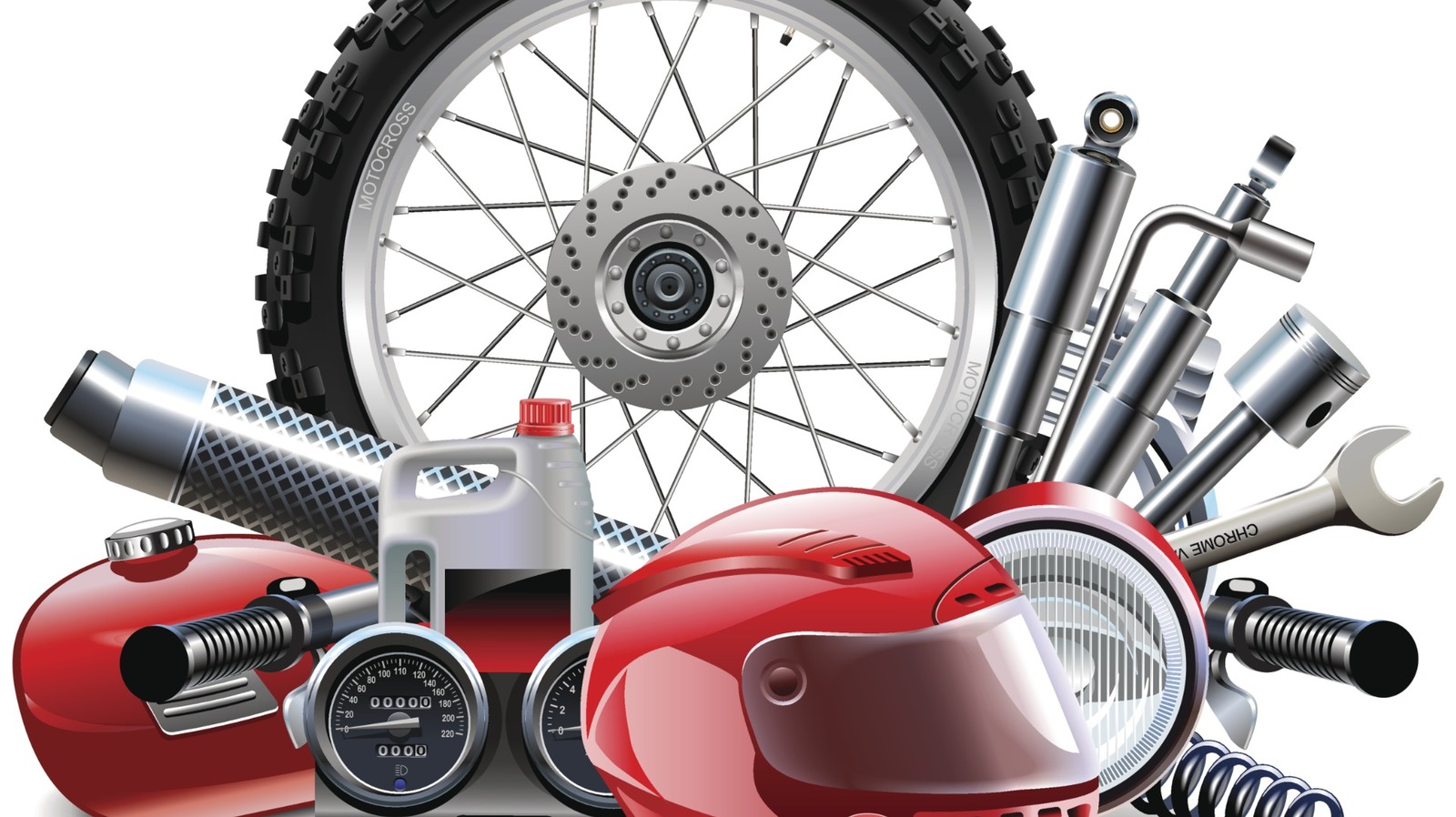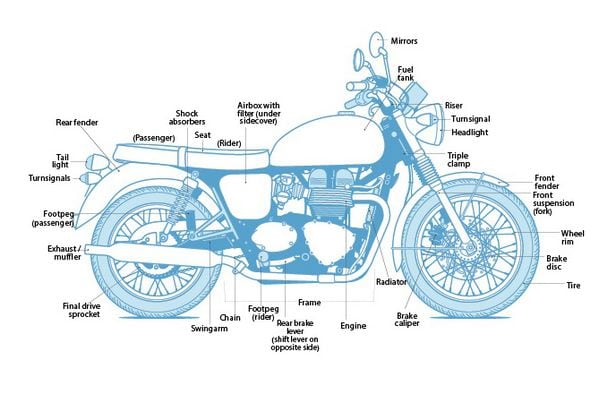How Proper Motorcycle Spares Christchurch Maintenance Affects Safety and Performance
How Proper Motorcycle Spares Christchurch Maintenance Affects Safety and Performance
Blog Article
Discover the Vital Motorcycle Parts You Required for Optimum Performance
Understanding the important parts of a motorcycle is essential for achieving peak performance. Each part, from the engine to the braking system, plays an essential role in overall functionality and security. Routine upkeep can prevent unanticipated failures and boost the riding experience. Nevertheless, lots of bikers overlook the intricacies of these systems. Uncovering exactly how they collaborate can lead to a more reliable adventure. What important parts should every biker focus on?
The Engine: The Heart of Your Motorcycle
The engine works as the core element of a motorbike, driving its efficiency and specifying its capacities. It is in charge of converting fuel into power, which powers the bike forward. Numerous kinds of engines are utilized, including single-cylinder, V-twin, and inline arrangements, each offering distinct features fit for different riding objectives and styles. The engine dimension, commonly measured in cubic centimeters (cc), significantly affects efficiency, with larger engines normally offering more power and torque.Furthermore, the engine's design and technology, such as fuel shot systems or air-cooling versus liquid-cooling, affect efficiency and dependability. Maintenance is essential for peak operation; aspects like normal oil changes and checking spark plugs assurance durability. Motorcyclists typically think about an engine's responsiveness and smoothness, as these features boost the total riding experience. Eventually, the engine remains an important element that specifies not just the motorbike's efficiency however also the rider's connection to the maker.
The Transmission: Changing Gears Efficiently
The transmission plays a vital duty in a motorbike's performance, especially in the technicians of equipment moving. Comprehending exactly how to move gears efficiently can enhance the general riding experience, while regular upkeep assurances peak performance. Correct focus to these elements can greatly affect the durability and effectiveness of the motorcycle.

Gear Shifting Mechanics
Smooth equipment changing is crucial for perfect motorbike performance, greatly impacting both velocity and control. The mechanics of gear changing entail the interaction in between the clutch, equipment lever, and transmission system. When a biker engages the clutch, it disengages the engine from the transmission, permitting an equipment adjustment without harming the parts. A well-timed release of the clutch, incorporated with precise motion of the equipment lever, helps with a smooth adjustment in between gears. This procedure ensures that the engine runs within its ideal power band, improving performance. Bike Parts Wellington. In addition, recognizing the gear proportions and their effect on rate and torque can help motorcyclists make informed options during shifts, ultimately adding to an extra pleasurable and receptive riding experience
Upkeep Tips Relevance
Regular maintenance plays a crucial function in assuring that the transmission system runs successfully, permitting smooth gear shifts. Regularly changing the transmission and examining fluid is crucial, as old liquid can lead to enhanced rubbing and wear. In addition, evaluating the clutch for wear guarantees peak interaction and disengagement, stopping slippage throughout gear adjustments. Lubrication of relocating components is equally important to decrease friction and improve performance. Bike proprietors ought to also keep track of for leaks and uncommon sounds, as these can indicate underlying issues. By adhering to these upkeep ideas, bikers can extend the life-span of their transmission system, ensuring that gear shifts stay seamless and adding to the overall performance of their motorbike.
The Braking System: Ensuring Safety on Every Ride
Braking systems are fundamental elements that straight influence a motorcycle's security and efficiency. They include different components, consisting of brake pads, blades, calipers, and hydraulic lines, all collaborating to assure efficient deceleration. The kind of stopping system-- normally either disc or drum-- impacts responsiveness and stopping power.Regular upkeep is important to support peak efficiency; used brake pads can bring about decreased performance and increased quiting ranges. Furthermore, the high quality of brake liquid must be kept an eye on, as it can soak up dampness with time, compromising braking efficiency.Riders need to also think about the significance of anti-lock braking systems (ABS), which prevent wheel lockup throughout sudden stops, boosting general security. Effectively functioning brakes are not practically stopping; they impart self-confidence in the rider, permitting much safer navigation with numerous surfaces. Eventually, a dependable stopping system is critical for taking pleasure in every experience with comfort.
The Suspension: Enhancing Convenience and Control
A well-functioning shock absorber greatly contributes to a motorcycle's total efficiency, complementing the efficiency of the stopping system. The suspension plays a substantial role in taking in shocks from irregular surface areas, assuring a smoother trip while preserving tire contact with the roadway. This get in touch with is essential for both security and control, allowing bikers to browse corners with self-confidence and precision.Different kinds of shock absorber, such as telescopic forks or mono-shocks, supply differing levels of comfort and handling. Correctly tuned suspension enhances responsiveness, supplying the biker with a more linked feeling to the motorcycle. Regular upkeep checks are essential to ascertain the suspension components, consisting of springtimes and dampers, are working at their best. A reliable shock absorber not just elevates the riding experience but additionally adds to the longevity of other motorcycle parts by decreasing wear and tear. Consequently, buying top quality suspension is important for any type of significant motorcycle fanatic.
The Tires: Linking You to the Road
Tires play a crucial duty in a motorcycle's efficiency, working as the primary link in between the rider and the roadway. Understanding the various kinds of tires readily available can greatly influence handling and safety. Additionally, normal upkeep is crucial to assure peak tire performance and longevity.
Tire Keys In Explained
How do various tire kinds affect a motorbike's efficiency? Tire types play this a vital function in figuring out a motorcycle's stability, hold, and handling. Sport tires, designed for high efficiency, offer boosted grip and responsiveness on paved roadways, making them optimal for competing and hostile riding. Conversely, visiting tires prioritize longevity and convenience, supplying a smoother experience for long-distance travel. Off-road tires, defined by their tough walk patterns, stand out in traction on unpaved surfaces, suitable for journey lovers. Additionally, dual-sport tires blend attributes from both on-road and off-road classifications, providing to versatile riding needs. Ultimately, picking the ideal tire kind is essential for maximizing performance, ensuring security, and improving the overall riding experience.
Upkeep Tips Offered
While riding when driving, maintaining ideal tire condition is crucial for safety and security and performance. On a regular basis examining tire stress is essential, as under-inflated tires can cause poor handling and boosted wear. It is a good idea to check step deepness frequently; used tires compromise grip and stability. Additionally, riders should seek indications of damages, such as lumps or fractures, which can show the requirement for replacement. Revolving tires occasionally assures even put on, improving long life. Moreover, maintaining tires clean from debris and avoiding excessive visuals can lengthen their life expectancy. Preserving correct positioning and balance contributes to peak efficiency, minimizing tension on other bike components. Following these maintenance pointers will greatly enhance the total riding experience.
The Fuel System: Fueling Efficiency and Efficiency
The gas system plays a vital duty in optimizing a motorbike's performance and effectiveness, as it assures the ideal shipment of gas to the engine. It consists of several essential components, including the fuel tank, gas pump, gas filter, and gas injectors or carburetor. Each part needs to function successfully to assure a smooth and powerful ride.The fuel storage tank stores gas and provides it Look At This to the engine using the fuel pump, which generates the essential pressure. A fuel filter prevents contaminants from getting in the engine, while the injectors or carburetor mix fuel with air for combustion.Proper upkeep of the gas system is vital; a clogged filter or malfunctioning injector can result in reduced efficiency and increased fuel consumption. By confirming that the fuel system operates efficiently, riders can enjoy enhanced throttle feedback, next page much better gas economy, and on the whole enhanced riding experience.
The Electrical System: Powering Your Trip
An effective electrical system is important for the overall performance and security of a motorbike, as it powers crucial components such as the ignition, lighting, and numerous digital systems. This system includes the battery, which stores energy, and the generator, liable for generating power while the engine runs. The circuitry harness attaches these components, guaranteeing reputable power distribution.Additionally, merges safeguard the system from overloads, while relays aid manage high-current devices with low-power signals. A well-maintained electric system boosts efficiency by making sure smooth starts and regular operation of lights and signals, essential for rider presence and safety.Regular checks of the battery's charge and links are essential for preventing electric failures. Cyclists ought to additionally evaluate circuitry for wear and tear, guaranteeing all elements operate preferably. Ultimately, a durable electric system adds considerably to the overall performance and dependability of the motorcycle.
Regularly Asked Questions
Just how Frequently Should I Change My Bike's Battery?
The frequency of motorbike battery replacement depends on use and upkeep (Oem Parts New Zealand). Normally, batteries ought to be changed every three to five years. Routine checks can aid identify when a substitute is necessary for peak performance
What Devices Do I Required for Fundamental Motorbike Maintenance?
For basic motorcycle maintenance, one calls for crucial devices such as an outlet collection, wrenches, screwdrivers, pliers, tire stress scale, and a torque wrench. These devices promote efficient maintenance and ensure the motorbike runs efficiently and safely.
How Can I Improve My Motorbike's Aerodynamics?
To improve bike aerodynamics, one must consider readjusting fairings, utilizing windshield extensions, maximizing body placement, and minimizing overall weight. These modifications aid reduce drag, improving security and gas performance throughout rides.
What Are the Indications of a Failing Electric System?
Indications of a falling short electrical system consist of lowering lights, problem starting, uneven instrument readings, and blown merges. Motorbike Components NZ. Unusual smells or deterioration around battery terminals may likewise indicate underlying concerns needing immediate attention for safety and performance

How Do I Choose the Right Oil for My Bike?
When selecting oil for a bike, one should consider the producer's requirements, thickness rankings, and the kind of riding. Additionally, synthetic versus standard oil can affect performance and engine defense, influencing the choice significantly. The engine size, generally measured in cubic centimeters (cc), considerably affects performance, with larger engines normally supplying more power and torque.Furthermore, the engine's layout and innovation, such as gas injection systems or air-cooling versus liquid-cooling, affect performance and reliability. A well-functioning suspension system considerably contributes to a motorbike's overall performance, matching the effectiveness of the braking system. The gas system plays a vital duty in maximizing a motorcycle's efficiency and effectiveness, as it assures the optimum distribution of gas to the engine. A fuel filter stops pollutants from entering the engine, while the injectors or carburetor mix gas with air for combustion.Proper upkeep of the gas system is essential; a clogged up filter or malfunctioning injector can lead to reduced performance and increased gas intake. A well-maintained electrical system enhances efficiency by guaranteeing smooth beginnings and regular operation of lights and signals, crucial for biker visibility and safety.Regular checks of the battery's cost and connections are vital for protecting against electrical failures.
Report this page